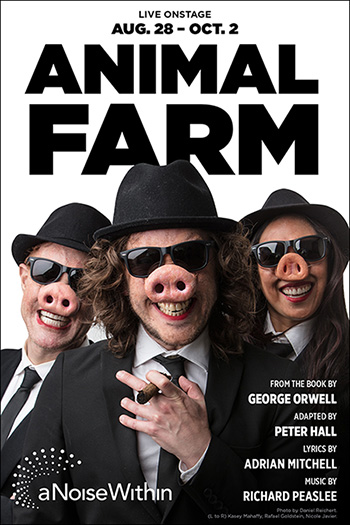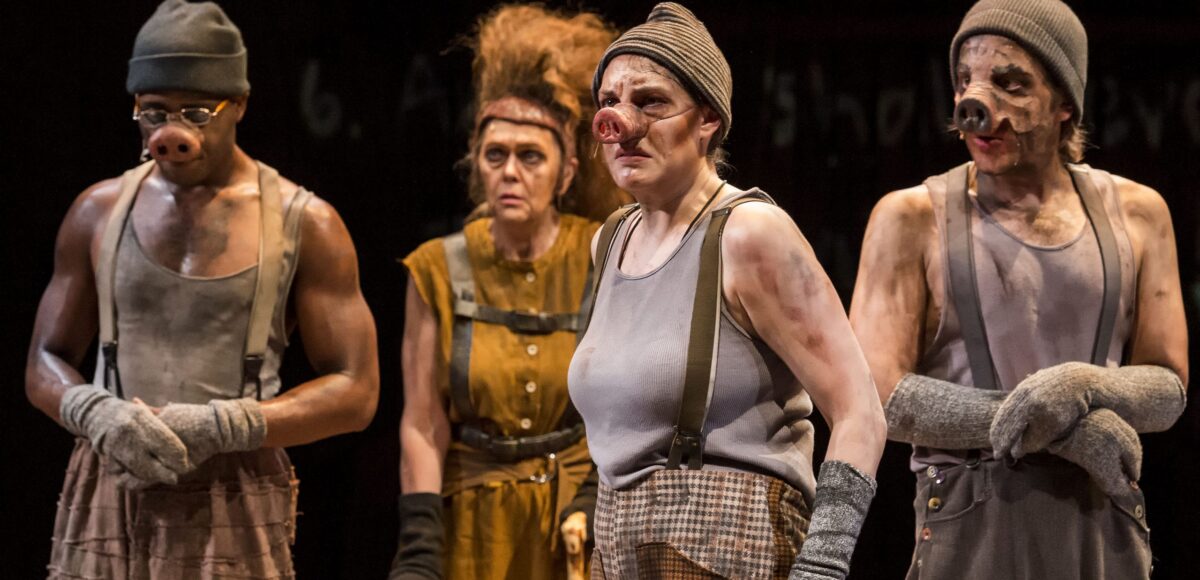By Ernest Kearney — Throughout its 30-year history, A Noise Within has demonstrated, for any theatrical company, the strategy for success. A focused concentration on a creative field, an unflagging commitment to artistic integrity, and a distinct structure in place to assure that neither that focus nor that commitment is ever threatened with compromise.
A large part of the third element is ANW’s dedication to working with young actors, educators and during the recent pandemic extending classes to homeschoolers, thus developing not only the talent to perform on their stage, but the audiences to enjoy them.
ANW’s current production of Sir Peter Hall’s 1984 musical adaptation of George Orwell’s Animal Farm reflects in its staging all of the strengths that have contributed to their status as one of the brightest gems in the crown of LA theatre.
Orwell’s 1945 political fable is familiar to most thanks to its prominence on nearly every academic reading list. Orwell’s genius in camouflaging his condemnation of the Bolshevik revolution and the rise of Stalin behind the engaging tale of pigs, cows, chickens and other livestock rising up to end the abuse of the drunken farmer Jones, not to mention the pithiness of the work assured it was one of the few titles on those lists that students actually read.
Entering the theatron, the first thing that one encounters is the stylish barn set designed by Angela Balogh Calin.
A somber line of indistinguishable, dark jacketed figures march onto the stage each carrying a crate. They all position their crates in a line and sit backs to the audience. Then, in lock step, they don their animal features, and in Farmer Jones case, clutches a book.
Thus we have entered the world of Animal Farm.
The setting is the ramshackled farm “The Manor” fallen into decrepitude due to the neglect of its alcoholic owner Mr. Jones (Bret Emmett) One night a secret meeting of all the animals is called by Old Major (Geoff Elliott) the farm’s aged prized Middle White boar.
Old Major, Orwell’s stand-in for Marx/Lenin, tells of a dream he has had wherein humans were overthrown by the downtrodden beasts of burden. The call for revolution is eagerly taken up by the pigs Napoleon (Rafael Goldstein) and Snowball (Stanley Andrew Jackson) four-legged doppelgangers for Stalin and Trotsky respectively, and they lead the animals into open revolt wherein they drive Jones from the farm.

Now the animals all join into achieving their dream – Old Boxer (Geoff Elliott, again) the loyal, native cart horse whose two constant reframes are “I must work harder,” and “Napoleon is always right.” Moses (Cassandra Marie Murphy) the Raven who avoids work by regaling the animals with his yarns of the mystical Sugarcandy Mountain where poor animals will rest happily forever after death, Muriel the goat (Philicia Saunders), Mollie the vain pony (Nicole Javier), Squealer (Trisha Miller) the fat Sus domesticus apparatchik, Clover (Deborah Strang) the mare with true socialistic compassion, the apolitical cat (Sedale Threatt Jr.), and the donkey Benjamin (Jeremy Rabb), the oldest and most cynical of all the animals.
There are also assorted hens, cows, dogs, pigeons and sheep (played ably by the very busy Murphy, Javier, Emmett and Threatt)
Director Julia Rodriguez-Elliott moves Orwell’s narrative of the socialist paradise lost with a sure handed dexterity as Napoleon betrays the revolution, eliminates all those opposing him, and sells out his beastly brethren to the humans.
This is an appreciatively fine production of superb stagecraft and plain merit who’s only failing can be described as having stayed too stringently within the lines of the original material.
Hall’s adaptation, no matter how highly admired it may be, is stunningly flawed. Gone is the disturbing brutality of Orwell’s novel that creeps like a cancer over the story eventually claiming all those that were true to the cause. But the gravest error on Hall’s part was the stunting of the relationships between the animals themselves; first and foremost that between the good hearted Boxer and the wry and ascetic Benjamin.
As Orwell writes of Benjamin in the opening of Animal Farm, “…without openly admitting it, he was devoted to Boxer; the two of them usually spent their Sundays together in the small paddock beyond the orchard, grazing side by side and never speaking.”
The reader shares in Benjamin’s love and concern for his friend, and we share in his anguish at his eventual fate. With this missing from Hall’s adaption, so is the heart of Orwell’s novel.
The musical score by Richard Peaslee with lyrics by Adrian Mitchell while too derivative of Kurt Weill’s Rise and Fall of the City of Mahagonny, nevertheless provides some harmonic highpoints with Beasts of England, the Nothing Song and This Isn’t What We Wanted.
Costumes also by Calin with help from Tony Valdés make-up and wigs, Ken Booth’s lighting design and Kate Wecker’s sound score join with Rodriguez-Elliott’s fine cast and direction to lift the production above the limitations of the material, concluding with the stark and grim tableau as the pigs become men and the men become pigs, while the lowly animals or lower classes remain exploited, manipulated and abused.
(NOTE: In Featured image – Stanley Andrew Jackson III, Deborah Strang, Trisha Miller, Rafael Goldstein / Photo by Craig Schwartz)
‘Animal Farm’
Plays thru October 2nd
WHERE:
A Noise Within
3352 E Foothill Blvd.
Pasadena, CA 91107
FOR TICKETS AND ADDITIONAL INFORMATION PHONE
(626) 356-3100
OR GO TO:
Remaining Performances:
Thursday at 7:30p.m.: Sept. 29
Fridays at 8 p.m.: Sept. 30
Saturdays at 2 p.m.: Sept. 24, Oct. 1
Saturdays at 8 p.m.: Sept. 24, Oct. 1
Sundays at 2 p.m.: Sept. 25, Oct. 2





